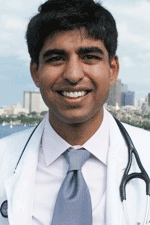Advertisement
$1,000 Prize — And The Chance To Vent About Health Costs

- Costs of Care founder Neel Shah
Wanted: Hair-raising or heartbreaking tales about health care costs.
Say you're a doctor. Your patient asks you how much the surgery you're recommending will run him, and you have to confess that you don't have the faintest idea. Or another patient says, "I'm still feeling a little tired. I think I"ll wait until tomorrow to go home from the hospital," and you think but do not say, "Do you understand that this will cost you $2,500??"
Or say you're the patient. You assume your health insurance will cover the procedure you need, and find out only weeks later that you're facing thousands of dollars in bills. Or you go into the emergency room after a fender bender and find yourself undergoing head-to-toe body scans that will leave you deep in debt.
A Boston non-profit group, Costs of Care, has just announced a national contest aimed at gathering "the best anecdotes from patients and clinicians illustrating the importance of cost-awareness in medical decision-making." The judges include former Gov. Michael Dukakis; Jeffrey Flier, the dean of Harvard Medical School; and surgeon/New Yorker writer Atul Gawande. The deadline is Nov. 1, and details are here.
Dr. Neel Shah, the founder of Costs of Care and a resident in obstetrics and gynecology at Brigham and Women's Hospital, says the contest stemmed from "my belief that one compelling story is worth 100 academic papers on a subject."
"We already have evidence that health care costs are harmful to the country and to Americans on the individual level," he said. "We don't need more of that, what we need is motivation."
Shah founded Costs of Care last year, with the "crazily ambitious" goal of bringing on "a paradigm shift in the culture of medical decision-making toward more cost awareness."
"For generations," he said, "it’s always been that if you’re going to give a patient a test or treatment, there are two criteria: it has to be safe, and if proven safe, it has to have some reasonable chance of working. And if it might work, you can go ahead and do it." In fact, Shah said, "it's increasingly important to ensure that not only it's safe and it works, but that it’s reasonably cost effective." Not that he's advocating Draconian denials of care: "I want this to be about doctors and patients making decisions together," he said.
[Relevant digression: Dr. Arnold Relman reviews a new book, "Tracking Medicine: A Researcher's Quest to Understand Health Care" in the latest New York Review of Books. He writes in part:
Of all the providers of medical care, physicians are most important in determining how much will be spent. In the US they account for only about 20 percent of medical expenditures, of which about half they use for expenses. But in treating patients, physicians call on the facilities and services of all the other providers of care—hospitals, imaging centers, diagnostic laboratories, manufacturers of drugs and equipment, etc.—and thus they control most medical expenditures.
Entries have begun to roll in for the contest, Shah said, and some of the most compelling involve people who had health insurance but then found themselves facing enormous bills. One entrant has already posted an enlightening story in the Comments section here about saving $12,000 by using over-the-counter skin treatments even though insurance would cover prescription medication.
Sponsors include Massachusetts insurers — Blue Cross Blue Shield, Harvard Pilgrim and Tufts Health Plan — as well as Beth Israel Deaconess Medical Center and the American Association of Physicians of Indian Origin.
p.s. If you're sending in an entry and want to send it to CommonHealth as well for posting, just hit the "Get in touch" button at the bottom of the site and send it along for consideration.
This program aired on September 13, 2010. The audio for this program is not available.
